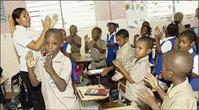
Kelly Avila, Spanish teacher at the Stella Maris Preparatory School in St Andrew, gets her students involved in a song during Spanish class. Students as young as two years old are exposed to the foreign language at the prep school. - Norman Grindley /Deputy Chief Photographer
"Buenos dias, Buenos dias. ¿Cómo está? ¿Cómo está? Muy bien gracias, muy bien gracias, ¿Y usted? ¿Y usted?"
This was the greeting The Gleaner received last Wednesday upon entering class K-2 at the Stella Maris Preparatory School on Shortwood Road in St Andrew.
The five-year-olds sing in excitement as their Spanish teacher, Kelly Avila, demonstrates her agility by showing them the moves to the chorus.
These kindergarten students are among just a few children attending early-childhood institutions across the island who are enjoying the benefits of learning a second language.
Marcia Robinson-Smith, one of two Spanish teachers at Stella Maris, said the students have been extremely receptive to learning the language.
Soaking up everything
"The younger you are, when learning a second language, the better it is for you," she told The Gleaner. "The children are like sponges, just soaking up everything, their language-acquisition skills are really clicking at this age and so they get very excited about learning," she added.
Students at Stella Maris start learning a second language from the preschool level, at age two. "We find ways of motivating them through puppetry, song, drama, dance, the TV and DVDs, because children learn best when they are being entertained," said Robinson-Smith.
The Spanish teachers were quick to encourage other early-childhood institutions to add a second language to their curriculum, as the benefits are endless.
Robinson-Smith noted that one of the main advantages was that the children learn respect for unfamiliar cultures and peoples.
"It requires that you would have to take special time out to concentrate on something that is foreign to you, therefore you learn to be respectful and tolerant," she said. "You will be able to communicate with individuals other than your local people and so, in turn, it removes boundaries and barriers."
French and Spanish teachers Tracy Waugh and Aileen Haye-Brown, at the Mona Preparatory School on Hope Road in St Andrew, echoed the views of Robinson-Smith.
Haye-Brown, who teaches Spanish at the prep school to students four years old and upwards, said children tend to do better at the Caribbean Secondary Examination Certificate level when they are exposed to the subject at an early age. The school has had a vibrant French, Spanish and sign language programme for more than 20 years.
Citrine Dixon, vice-principal at Mona, however noted that for the first time this year the school has been phasing out French due to a shortage of teachers in that language.
"French will now only be done at grades five and six," she said.
Programme put on hold
The Pentab Basic School, on Wildman Street in downtown Kingston, is one other early-childhood institution that has included Spanish in its curriculum since 2006. Unfortunately, the class of anxious four and five-year-olds who were excited about learning the foreign language this year will not get the chance, as the programme has been put on hold.
"We are really sad that we won't be able to offer the language this term, because the students were really looking forward to it," Principal of the school, Marcia Williamson, told The Gleaner.
Williamson said the programme had to be postponed this term as the Spanish teacher, Cleon Barrett, had to go on study leave.
"We weren't able to get a substitute in time," she explained. She, however, said the school plans to reimplement the Spanish programme, as well as its sign language class come September.
Significant advantages
Chief Education Officer, Jasper Lawrence, said while the Ministry of Education recognised the significant advantages to teaching a foreign language at the early-childhood level, there were no immediate plans to introduce such a programme on a wide scale.
He explained that this was mainly due to a shortage of resources, including foreign-language teachers.
Lawrence, however, said the ministry was now doing the groundwork for the expansion of the Spanish programme at the primary level.
"It is something that the ministry is really concerned with and we are taking the necessary steps to having Spanish delivered at the primary level," he said.
"We have a programme now in the training colleges where we offer scholarships to persons who would like to be prepared as teachers to teach Spanish at the primary level."
The programme is now in its second year, with the first group expected to graduate in another two years.
athaliah.reynolds@gleanerjm.com